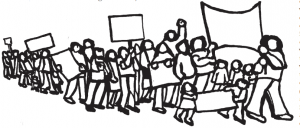[Editor’s Note: The Democratic candidate for US Senate in Mississippi lost a run-off vote, prompting one outsider to conclude voters are “still a bunch of hateful white people no matter how we try. We need to cut our losses and focus on the states that will make real change.” Here is a more resolute view]
Thank God Mrs. Hamer and Medgar Evers didn’t “cut their losses.” They and others toppled segregation in spite of a “bunch of hateful white people.” And some of those white folks learned and did better…
There are no shortcuts
In our culture of immediate gratification, we expect difficult cultural change to occur in an instant, by fiat or tweet. It never has and never will. There are no shortcuts to the everyday process of building inclusive relationships and trust in order to change mindsets and actions. An election is not a movement.
We are awake in Mississippi on a new day. There are children to feed and elders to love and minds to change. |
A movement for liberation requires long-term commitment. It requires truth-telling and courage and patience. And a movement should celebrate moving the needle, as Mississippians did. While President Trump won the state by eighteen points, organizing in that state cut the GOP advantage in the Senate race by more than half, to 8 points, even though Republicans outspent Democrats 4 to 1. More folks showed up to vote in Hinds County for the runoff than voted in the regular election. That is unheard of, people! And that work didn’t just happen in the last six months.
We’re awake and there’s work to do
Beyond this one election, I hope what’s also been lost is the illusion that we can change Mississippi (or this nation) without hard work. I hope some of us lose the myth that organizing doesn’t work and doesn’t deserve support. I hope we’ve lost the idea that if we ignore racism it will just go away.
We are awake in Mississippi on a new day. There are children to feed and elders to love and minds to change. We have work to do and no time to coddle mercurial attention spans.
This quote is excerpted from a statement by Susan Glisson in Facing South, the on-line magazine of the Institute for Southern Studies.

Be First to Comment